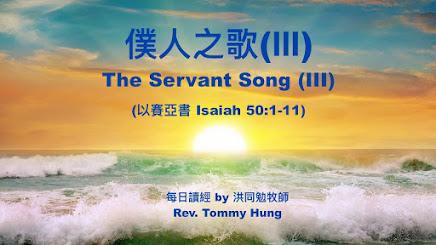主! 提醒我耳朵, 使我能聽, 像受教者一樣
Lord! Awaken my ear so that I can hear as those who are taught.
僕人之歌(Ⅲ)
The Servant Song (III)
經文: 以賽亞書 Isaiah 50:1-11
釋義 : 以賽亞繼續回應以色列人投訴: 「耶和華離棄了我, 主忘記了我。」(四九14)先知說, 耶和華沒有離棄他們。事實剛好相反, 是以色列人自暴自棄。
Insight: The prophet continues to respond to the Israelites regarding their complaint, “the Lord has forsaken me; my Lord has forgotten me” (49:14), saying that the Lord did not forsake them. The fact is just the opposite of their belief – the Israelites are abandoning themselves.
●作繭自縛 本章的信息首尾呼應: 開始的第一節, 耶和華說明祂沒有刻意追討以色列人的罪。但按照因果定律, 以色列人犯罪必然受到懲罰的報應。最後一節(11), 更進一步, 以玩火自焚比喻以色列人自作自受。換句話說, 以色列人被擄被賣, 是神兩種本性──慈愛和公義的角力。神並非放棄慈愛憐憫, 只是祂必須維護公義的性情。
Spinning a cocoon around themselves – The message at the beginning echoes the ending: At the beginning in verse 1, the Lord says clearly that He is not going after the Israelites for their sin deliberately. But according to the law of causality, the Israelites must suffer retribution from the punishment. In the last verse (11), it goes further to symbolize the Israelites’ reaping what they sow with getting burnt playing with fire. In other words, the Israelites being carried off and sold is a result of God’s two characteristics, loving and righteous, wrestling with each other. God is not renouncing love and mercy, but He must maintain His righteousness.
●咎由自取 耶和華是公義的神。祂不會對人只顧慈愛施憐憫,而壓抑伸張正義。耶和華對自己也是公義的: 祂必追討罪, 這是伸張正義。但是祂也設立除罪的方法──人只為罪受罰一次; 所以接受救恩的人, 就因蒙代贖而免再付罪價, 這也是神的公義原則。耶和華在維護公義時, 也兼備慈愛, 主動發出救恩呼籲。只可惜: 「我來的時候, 為何無人等候呢? 我呼喚的時候,為何無人答應呢?我的膀臂豈是縮短、不能救贖嗎?我豈無拯救之力嗎?」(2)所以人因罪受罰,是咎由自取。他的咎不是曾經犯罪(雖然這是事實), 而是不肯接受解除罪的方法。
Being victims of their own making – The Lord is a righteous God; He will not favor showering love and mercy and suppress seeking justice. The Lord is righteous to Himself as well: He will go after sin, and this is to pursue justice. However, He also devised a method to blot out sin – we will be punished only one time for our sin; those who accept the salvation will not have to pay again because of the redemption paid on their behalf; and this is the principle of God’s righteousness. While the Lord upholds righteousness, He is also loving, actively urging for people to accept the salvation. Unfortunately, “Why, when I came, was there no man; why, when I called, was there no one to answer? Is my hand shortened, that it cannot redeem? Or have I no power to deliver?“ (2) Therefore, it is one’s own fault that he will be punished for his sin. His fault is not because he has sinned (although this is a fact), but because he refuses to accept the solution that washes sin away.
●僕人相勸 耶和華除了自己發出邀請外, 還差遣僕人呼籲(10)以色列人歸向神。這以賽亞書中四首的第三首僕人之歌(4~9), 詳細描述頭的各部(6節提到頭以外的背), 作僕人事奉的比喻:
- 受教者(意久經鍛鍊)的舌頭 — 事奉的目的: 用言語扶助疲乏的人(4)。
- 開通的耳朵 — 事奉的能源: 從神領受信息(4)。
- 腮頰的鬍鬚 — 事奉的代價:任由人打、拔(6)。
- 並不掩面 — 事奉的態度: 不以福音為恥(6~7)。
- 硬著面臉 — 事奉的堅忍: 好像堅石(7)。 而僕人事奉最大動力, 不是自己的意志或潛力, 而是確知「耶和華必要幫助我」(7,9)。
Counsel from God’s servants – Apart from delivering the invitation Himself, the Lord also commissions servants to plead with (10) the Israelites to turn to God. This is the third of the four Servant Songs (4-9), describing every part of a head in detail (verse 6 mentions the back beyond the head) symbolizing a servant serving the Lord:
- The tongue of those who are taught (meaning having had extensive training) - The purpose of serving: Using words to help those who are weary (4).
- Opened ear – The energy for serving: Receiving messages from God (4).
- Beard on the cheeks – The price for serving: Being slapped and pulled by others (6).
- Not hiding the face – The attitude of serving: Not being ashamed of the gospel (6-7).
- A look of unwavering determination – The perseverance of serving: Like a flint (7). - The greatest drive for a servant is not from his own will power or potential but the clear understanding that “the Lord God helps me” (7-9).
歐美流行一個這樣的政治笑話:
A political joke that’s circulating in the Western world:
保守派看見十丈外有人快滅頂了, 便拋出五丈長的繩索, 同時叫噥著鼓勵對方, 要他好自為之, 游過來抓住繩索。自由派則對五丈外快要滅頂的人拋出十丈長的繩索, 然後將繩索的這一頭撒手不管, 一走了之, 再從事另一善舉。
The Republicans saw a man about to drown 100 feet offshore. They threw him 50 feet of rope, encouraged him to swim over to grab the rope, and yelled out to him, ‘The rest is up to you.’ As for the Democrats, they threw 100 feet of rope to a man about to go under the water 50 feet offshore, then let go of their end, and engaged in another good deed.
耶和華卻不是這樣, 他不但向人提出救恩方案, 更身體力行, 與人共同進退, 祂的幫助是切實和具體, 你願意接受祂的幫助, 一起面對挑戰嗎?
The Lord is not like that. Not only did he propose a salvation plan, He also took part in the process, staying with us through thick and thin. His help is steadfast and concrete. Are you willing to accept His help and face the challenges together?
每日讀經 by 洪同勉牧師 Rev. Tommy Hung
English Translation: Ms. Lori Wong





